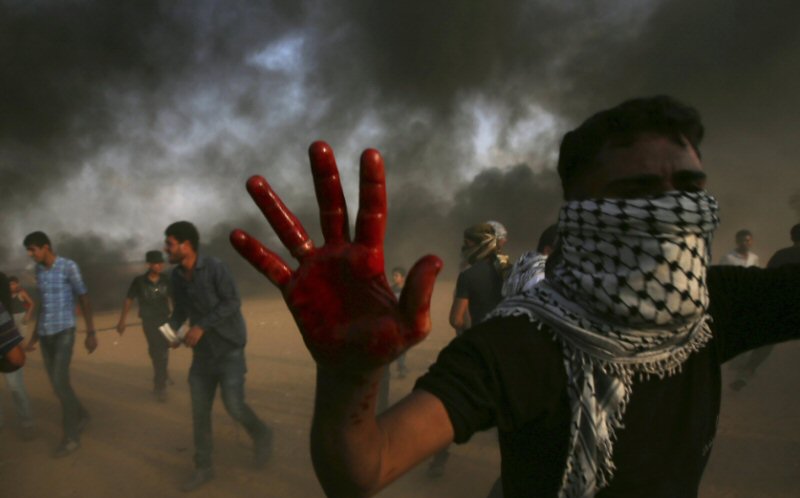Motasem Ahmed Dalloul is a staff writer at the Middle East Monitor. He is a specialist in the Middle East affairs.
Despite Palestinian attempts to calm the Great March of Return, Israeli occupation snipers stationed along the eastern fence of the besieged Gaza Strip escalated their crackdown on the protesters this weekend. During the 31st Friday of the Great March, Israel killed six Palestinians and wounded more than 230 others, including around 30 children and four paramedics.
Following this violent crackdown, Israeli fighter jets began the widest wave of airstrikes since August. Though there were no reports of human casualties, the heavy attacks caused severe damage to the Indonesian Hospital in the south of the Gaza Strip. Four major security service headquarters across the coastal enclave were also damaged, as well as several military bases belonging to the Palestinian resistance movement.
These killings and this wave of Israeli attacks came amidst the ongoing Egyptian discussions with the Palestinian resistance factions in Gaza, the Palestinian Authority (PA), Fatah officials in the occupied West Bank and Israeli officials. The Egyptian efforts – backed by the UN – should have achieved some progress, a senior Hamas leader in Gaza told MEMO.
An Islamic Jihad leader who attended the meetings with the Egyptians also confirmed that the ongoing truce efforts could be fruitful this time. Speaking to local newspaper Al-Ayyam, he said that the Israelis told the Egyptians they would lessen the 12-year-old siege imposed on Gaza, promising to offer more concessions in the future on the condition that the Great March of Return was reduced. The Palestinian factions refused and stressed that they first wanted to see the Israeli offer materialise on the ground.
However, the Islamic Jihad leader also said that the Palestinian factions worked with the High Committee for the Return and Lifting the Siege Protests in order to “reduce the human losses during the protests”. This means that, on the ground, the Palestinian resistance factions have responded to the Israeli demand and started to calm the protests. The Israeli occupation, however, did not uphold its end of the bargain. In order to justify its violation, the Israeli occupation army claimed that its attacks were meant to deter Syrian and Iranian interference in Gaza.
The Israeli army claimed that its airstrikes came in response to Palestinian rocket attacks from Gaza. Meanwhile, Israeli newspaper Haaretz cited an Israeli army spokesperson blaming Iran and Syria for the attacks, claiming they “were led by the Islamic Jihad with clear guidance from Iran and the Revolutionary Guards’ Quds force in Syria […] The entire incident was under Iran’s guidance through the Quds force that led the attacks”.
Where is Israel’s evidence that the rockets launched from Gaza were directed by Syria and Iran? Of course, it has no evidence! Yet if we argue that the main reason for firing primitive rockets from Gaza was continued Israeli aggression against the Palestinians and its violation of their rights, we will be able to provide an unlimited amount of evidence. The latest of this evidence is Israel’s use of lethal force against peaceful protesters in Gaza, which killed six Palestinians, as well as attacking protesters in the occupied West Bank the same day.
After a dreadful night Islamic Jihad, which responded to the Israeli airstrikes on Gaza, said that the Palestinian factions had accepted Egyptian mediation and reached a new ceasefire with the Israeli occupation. It said this was in order to give the Egyptian efforts chance to achieve their goals, including lifting the Israeli siege imposed on Gaza and reaching a long-term truce with the Palestinian resistance. The real question now is whether the Israeli occupation will commit to this ceasefire and carry out the promises it pledged?
~Middle East Monitor/Days of Palestine
Disclaimer: The views expressed in this article are the author’s own and do not necessarily reflect Days of Palestine’s editorial policy.
Opinion/Analysis 10/27/18: Why Israel Sees BDS As A ‘Strategic Threat’

